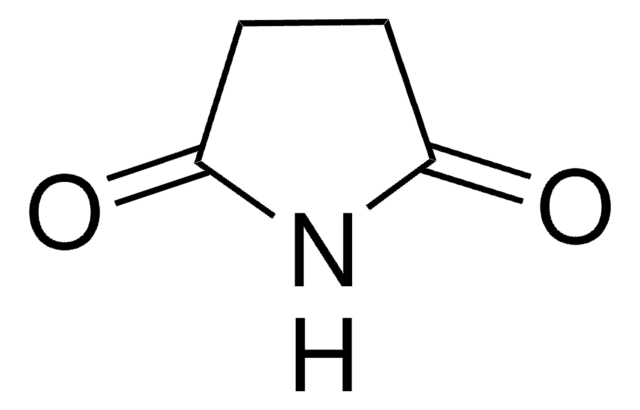11709
Barbituric acid
for spectrophotometric det. of cyanide, ≥99.5%
Synonym(s):
2,4,6-Trihydroxypyrimidine, Malonylurea
About This Item
Recommended Products
Quality Level
Assay
≥99.5% (HPLC)
≥99.5%
form
solid
quality
for spectrophotometric det. of cyanide
technique(s)
UV/Vis spectroscopy: suitable
ign. residue
≤0.05%
mp
248-252 °C (dec.) (lit.)
anion traces
chloride (Cl-): ≤50 mg/kg
sulfate (SO42-): ≤500 mg/kg
cation traces
Ca: ≤10 mg/kg
Cd: ≤5 mg/kg
Co: ≤5 mg/kg
Cr: ≤5 mg/kg
Cu: ≤5 mg/kg
Fe: ≤5 mg/kg
Mg: ≤10 mg/kg
Mn: ≤5 mg/kg
Ni: ≤5 mg/kg
Pb: ≤5 mg/kg
Zn: ≤5 mg/kg
SMILES string
O=C1CC(=O)NC(=O)N1
InChI
1S/C4H4N2O3/c7-2-1-3(8)6-4(9)5-2/h1H2,(H2,5,6,7,8,9)
InChI key
HNYOPLTXPVRDBG-UHFFFAOYSA-N
Looking for similar products? Visit Product Comparison Guide
Related Categories
General description
Application
Storage Class Code
11 - Combustible Solids
WGK
WGK 1
Flash Point(F)
302.0 °F - closed cup
Flash Point(C)
150.00 °C - closed cup
Personal Protective Equipment
Choose from one of the most recent versions:
Already Own This Product?
Find documentation for the products that you have recently purchased in the Document Library.
Customers Also Viewed
Our team of scientists has experience in all areas of research including Life Science, Material Science, Chemical Synthesis, Chromatography, Analytical and many others.
Contact Technical Service











